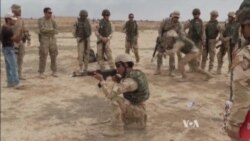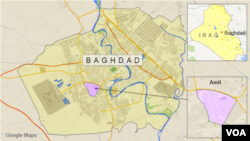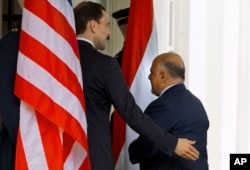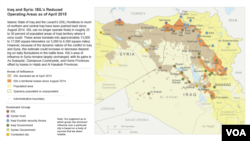President Barack Obama pledged $205 million in new humanitarian aid to Iraq on Tuesday but didn't mention providing additional weapons and military support sought by Iraqi Prime Minister Haider al-Abadi.
After the two leaders met at the White House, Obama said Iraqi forces were becoming better equipped and trained since Abadi's election seven months ago, and that with the support of U.S. airstrikes they had retaken about a quarter of the territory seized over the last year by Islamic State fighters.
Asked, however, about the additional weapons sought by Iraq, Obama said only that U.S. and Iraqi military coordination was improving to make sure that Baghdad's forces are successful.
The U.S. leader said he and Abadi also discussed Iran's involvement in the fighting in Iraq against the Islamic State militants. Obama said the U.S. expected Iraq and Iran, as neighbors, to have an "important" relationship, but that any military operations inside Iraq must be controlled by Baghdad.
"Any foreign assistance that is helping to defeat ISIL has to go through the Iraqi government," Obama said, using an acronym for the Islamic State militants. "That's how we respect Iraqi sovereignty."
Before the meeting, Abadi had said he wanted a "marked increase" in U.S. military aid to fight Islamic State militants. He acknowledged Iraq had received a boost in support from the U.S., "but we want to see more."
Obama authorized the airstrikes in Iraq — there have been nearly 1,900 over the last several months — as a way to thwart the militants in their effort to establish a borderless religious caliphate. The U.S. also has sent 3,000 troops to advise and assist Iraqi troops, but Obama has ruled out the use of U.S. ground troops.
Iraqi forces have succeeded in recent weeks in retaking substantial territory from the Islamic State fighters, including Tikrit, but the insurgents still hold large parts of two provinces, Ninevah and Anbar, plus Iraq's second city of Mosul.
As he left Baghdad, Abadi said terrorism threatens his country and beyond.
''We, in Iraq, are fighting terrorists on the ground. Terrorism is not only threatening Iraq, it threatens the region and the world alike," Abadi said. "We are in need of international support for curbing terrorism. The militants are now smuggling oil and antiquities in order to get money. Thus we are in need of an international effort to halt all criminal attempts by terrorists who aim to continue the bloodletting in Iraq.''
IS losing ground
A U.S. defense official Monday that recent IS losses were the result of a combined effort of the U.S.-led coalition airstrikes and a ground operation by Iraqi armed forces.
A new map released by the Pentagon shows that Iraqi forces have regained key territories in the north, near Tikrit, Sinjar Mountain and the Mosul Dam.
Pentagon spokesman Steve Warren told Alhurra television Monday that Islamic State lost control of nearly 15,000 square kilometers of the territory it had captured since last August.
"In Tikrit, as you know, we are concluding a very successful operation to liberate that city from the clutches of Daesh [Islamic State], and that operation has been largely successful. There are small parts of Tikrit which remain somewhat contested, primarily because Daesh left so many booby traps, so many IEDs and perhaps a few fighters, snipers and such that remain really only in the northern portion of Tikrit," Warren said, adding that efforts to push back Islamic State in Syria have been less successful.
"In Syria, ISIL has had some small gains in the city of Damascus and a little bit in the south, also a little bit in Aleppo, but ISIL has also lost some ground in Syria as well, particularly around Kobani. The difference is that in Iraq, the coalition air power is being supported by the brave soldiers of the Iraqi security forces," he said.
Coalition strategy
The Pentagon official said the coalition strategy is to prevent the militants from creating a safe haven in Syria while pushing them out of Iraq.
Some analysts say the real test in this battle against Islamic State will be in predominantly Sunni areas of Mosul and Anbar province.
"Who knows when that will actually happen, because if Iraq wants to do this right, it can't do it with Shia militias. It can't go into neighborhoods that are predominantly Sunni and run roughshod over these communities," said Brain Katulis of the Center for American Progress.
United Nations chief Ban Ki-moon welcomed the liberation of Tikrit, but expressed alarm at the reports of human rights violations and destruction of property perpetrated by militias fighting alongside Iraqi forces.
One way to prevent ethnic violence in areas freed from Islamic State is to form local army units to defend their own ethnic or religious communities.
“Iraq doesn't really have that now. And the current approach seems to be to try and create this ecumenical, multiethnic army that is a truly national force and will deploy from anywhere to anywhere within Iraq," said the Brookings Institution’s Michael O’Hanlon.
The militants still control large swaths of northern Iraq, including many oil refineries that help finance their campaign.
Zlatica Hoke contributed to this report from Washington, some material for this report came from Reuters.









